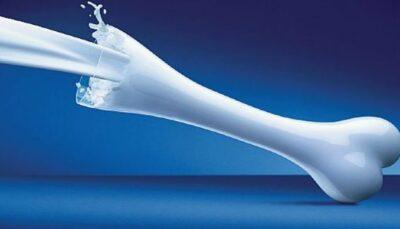Our country has been smeared with ads claiming that calcium is the fix-all for healthy bones, so dairy has been the go-to answer for generations.
One would expect, then, that the “got milk” campaign would have osteoporosis, the degeneration of bones, at an all-time low. Instead, it’s something that still affects millions.
Healthy bones may not seem like a big deal, but it’s more than simply having strong bones. About 300 million seniors suffer hip fractures each year, and 20-30 percent die from the complications of their injury. Having strong bones isn’t just a good idea. It can, and has been, a matter of life and death. Millions are suffering the consequences of compromised bones. Milk obviously isn’t the trick to preventing or curing osteoporosis, nor is it the only myth out there that’s affecting how we approach our health. There’s a lot more to it than simply drinking milk, so it’s time to separate the facts from the myths.
Got Milk And You’ve Got Strong Bones
The Myth: Calcium isn’t the one-stop fix-all for healthy bones. In fact, studies suggest the opposite. The British Medical Journal compiled two detailed studies from Sweden that actually suggest that higher dairy intake correlates with a higher risk of bone fracture.
The Hidden Secrets Of Making Herbal Medicines…Right At Your Fingertips!
The Truth: Calcium is imperative to bone health, as this mineral is responsible for hardening and strengthening bones, but it’s not the only factor in healthy bones. We need vitamin D in order to absorb calcium, so catching some sunlight or swallowing a vitamin is just as important as grabbing a cup of cottage cheese. The national recommendation is to hit 600IU of vitamin D and 1000mg of calcium each and every day, but it should be noted that countries with lower osteoporosis rates actually average less than half the calcium intake America recommends.
High Protein Equals Low Bone Density?
The Myth: Diets high in protein, specifically meat protein, can cause our bodies to produce acid and leach calcium, resulting in bone decay.
The Truth: Meat is being studied for acidifying properties, and red meat certainly shares a connection with cardiovascular disease but, at the end of the day, healthy bones need protein. Our bones are composed of collagen which is actually a type of protein, so these building blocks literally build our bones. On top of that they aid in calcium absorption and enable strong bone-supporting muscles, making protein a big player in bone integrity. Vegetarian protein sources definitely come along with health and digestive benefits, but meat protein benefits bones, too.
There’s No Such Thing As Too Much Calcium?
The Myth: Calcium makes strong bones. You can never have too much of a good thing, so it’s always a good idea to reach for another glass of milk.
Could This All-Natural ‘Detox’ Capsule Have Extended John Wayne’s Life?
The Truth: There’s actually such a thing as too much calcium, and it’s called hypercalcemia. It can cause big problems for our bones, kidneys and muscles, and fortunately the condition is rare. Strokes and heart attacks, on the other hand, are not. People getting the recommended 1000-1200mg a day through supplements show increased risk of cardiovascular disease. Obviously, calcium shouldn’t be our sole or primary focus.
Bisphosphonates Drugs Are the Answer?
The Myth: Osteoporosis can be treated or prevented with drugs like Fosamax or Boniva. Because these drugs increase the production of osteoblasts by killing osteoclasts (which kill cells within our bodies), bisphosphonates can increase density.
The Truth: Bisphosphonates will indeed wipe out osteoclasts, but this does not lead to stronger bones. Osteoclasts work with osteoblasts to rebuild our bones, so killing them off puts a halt to important upkeep and repair. That is NOT the answer that weak bones are looking for. Healthy bones require omega-3 fatty acids, vitamin D, and vitamin K, and the strengthening of weight-bearing exercises. There’s a reason weak bones are weak, and this needs to be the focus in any preventative plan.
Professionals, pharmaceutical companies and friends have plenty to say about what you should be doing and how you should be spending your money. Credentials and Facebook followers aside, there are always consequences and details that we need to consider before we jump on the next bandwagon. Talk to your healthcare provider and do your own research so that you can take charge of your health.
*Disclaimer: This article is intended for informational purposes only. This information is not intended to serve as a diagnosis or treatment for any particular health condition. Always seek medical guidance from a trusted health care practitioner.
What do you think? Share your thoughts in the section below:
Harness The Power Of Nature’s Most Remarkable Healer: Vinegar
 Off The Grid News Better Ideas For Off The Grid Living
Off The Grid News Better Ideas For Off The Grid Living





